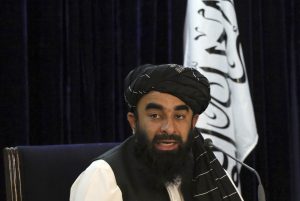The Taliban have announced the names of leaders who will be ministers in the group’s interim government in Afghanistan.
The move to appoint an interim set-up appears to be an effort to put in place some kind of a governing structure to run the country’s affairs, even as the Taliban’s feuding leaders and factions settle their differences over key posts in the new government.
According to reports, Mullah Abdul Ghani Baradar, the chairman of the Taliban’s Political Office in Doha, who was going to lead the new Afghan government, has not been given the post in the interim setup. Similarly, Sher Mohammad Abbas Stanikzai, who was poised to become foreign minister, has also been sidelined.
As for Sriajuddin Haqqani, he has been eyeing the post of head of the new government, which has been given now to Mullah Mohammad Hasan Akhund, a longtime head of the Taliban’s powerful decision-making body. However, the Haqqanis have managed to secure at least four senior-level posts, including the Ministry of Interior, which will be helmed by Sirajuddin.
“The fall of Kabul was enabled by the Haqqanis. Given their turf in eastern Afghanistan and strategic depth across the border in Pakistan, they were long well-positioned to go for the kill in Kabul,” Kamran Bokhari, director of Analytical Development at Newlines Institute for Strategy and Policy, said in a Twitter post.
“The bottom line is that the Haqqanis see themselves as having done the bulk of the heavy lifting for the Taliban movement for the past nearly two decades. And now that it’s time to be rewarded, they are demanding the lion’s share of the Emirate prize,” Bokhari noted.
The fight for power is not restricted to the top tiers of the leadership but also involves the middle and lower ranks. Everyone who has been part of the movement or helped it in its expansion expects to be accommodated at the provincial and district levels.
While the caretaker setup has many pro-Pakistan leaders, the lineup doesn’t necessarily address Pakistan’s concerns, especially those relating to the need for an inclusive government. Moreover, Pakistan is concerned over the Tehrik-i-Taliban Pakistan (TTP)’s sanctuaries in Afghanistan. Will the Taliban government address these concerns?
Islamabad has been pushing the Taliban to agree on forming an inclusive government that incorporates key leaders and figures not only from the previous government but also from minority ethnic groups. Such a government is more likely to secure diplomatic recognition and financial support from the international community.
Without such international support for the new government, the Taliban state structure could collapse. If stability doesn’t return to the country, the likely impact on Pakistan’s security will be huge. At this point, the interim set-up doesn’t look like an inclusive one, as it comprises the Taliban’s long-time ideologues and doesn’t include people from the previous government. Moreover, the interim government has several ministers, including Akhund, who are either U.S.-designated terrorists or figure in the United Nations sanctions list.
It is not surprising that Pakistan has refused to confer any credibility on the interim setup. Following the announcement of the setup, Pakistan’s Federal Information Minister Fawad Chaudhry told the BBC in an interview that “it would be premature to comment” on the situation.
If the Taliban don’t successfully form a functioning government, Pakistan’s task of getting Kabul to take action against the TTP would be all the more challenging. Already, the Taliban have refused to clearly state that they will act against the TTP.
Significantly, TTP attacks in Pakistan have risen significantly since the Taliban’s takeover of Afghanistan. On Sunday, four security personnel were killed and 19 suffered injuries when a suicide attack claimed by the TTP targeted a Frontier Corps check post in Quetta.
Infighting among key Taliban factions would enhance the chances of Afghanistan becoming a safe haven for TTP. Differences between the Taliban’s Quetta Shura and the Haqqani Network would also seriously impact the Taliban’s ability to establish its writ across the country. The Taliban government cannot be expected to function efficiently, take action against militant groups like the Islamic State, and also keep a check on potential anti-Taliban alliances if the Haqqanis withdraw their support from the group.
From Pakistan’s perspective, it is vital that the Taliban’s government quickly comes together. If the group continues to face challenges from within its ranks, Pakistan’s ability to tackle TTP will suffer.
Moreover, infighting within the Taliban’s ranks has the potential to spiral into conflicts across the country among the supporters of different factions and leaders, a scenario that Pakistan would surely want to avoid.
It is likely that the recent visit of Pakistan’s intelligence agency chief, Lt. Gen. Faiz Hameed, to Kabul was aimed at explaining to the Taliban’s leaders that the present circumstances, where the world appears ready to work with the group, offer an opportunity.
However, for that to happen, Taliban leaders cannot afford to engage in petty fights at the outset. They need to appear as a united group that is ready to take everyone onboard, including leaders who were part of the former regime.
If the Haqqani Network’s leadership believes it deserves a prominent role in the new administration, it is unlikely to give up this claim simply because Pakistan wants it to do so. Besides, if Afghanistan’s ethnic minorities are left out of the governing structure, it is a matter of time before one group or another starts another resistance movement against the Taliban.
The ensuing power struggle in Afghanistan is not what Pakistan wants to see as it prepares to contain the TTP and pushes for the international community’s engagement with Afghanistan under the Taliban.

































